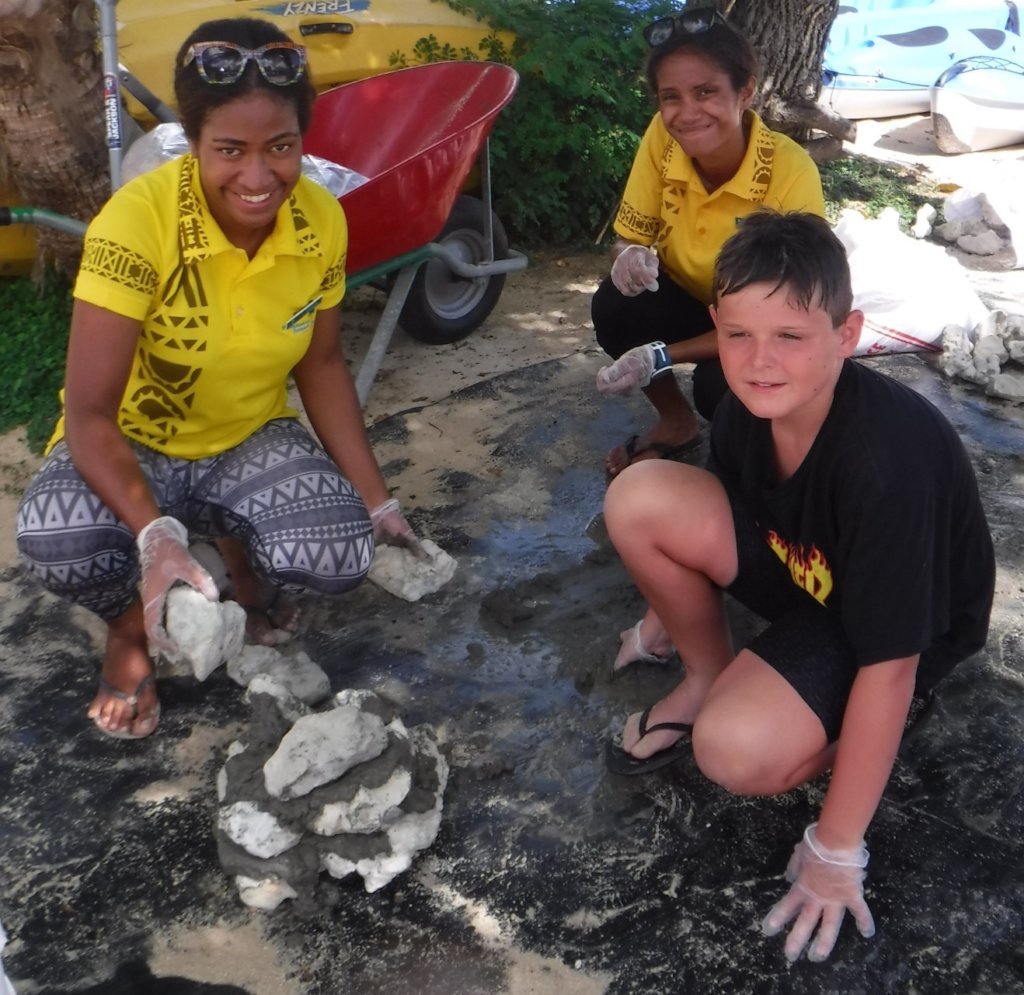By Austin Bowden-Kerby | Project Scientist, and defender of the corals
Coral bleaching has hit our Fiji sites. The hot Southern hemisphere summer is coming to an end, but it has taken a toll on our corals. The ocean water temperature got to 33C (90F) in the nearshore reefs and 30C (87F) on the outer cooler reefs. Many of the corals became badly stressed and lost their symbiotic algae and turned white, and some of those are now dead or dying, on both nearshore and outer reefs. However, on the positive side many corals did not bleach at all- they have shown themselves to be bleaching resistant 'super corals'. This is very encouraging.
Last year we trained 18 coral gardeners, two who are now employed full-time by Plantation Island Resort. These coral gardeners, Sera and Merekelini, were rather horrified by the bleaching, which was their first experience with so many corals dying. Some of the corals they had established in the nurseries are now badly bleached, and some have died. But I am thankful that this happened early on in their coral gardening careers, as they now know how important selection for heat tolerance really is! The girls have been busy collecting newly-killed corals for use in an educational display, rather than having this sadness be for nothing. And because the super corals are clearly identified now, we are making plans to sample as many of the unbleached corals as possible- to bring bits of them into the nursery- to replace the dead and bleached corals. The bleached corals that are still alive will be repanted to cooler water reefs to observe if they recover.
We have invited the resorts from around the Malolo district to send trainees for an emergency training on 13-17 May. Two scientists from the Australian NGO, People for Ocean, will be joining us as volunters and staying on for four months, and Sea Stewardship, a newly registered conservation NGO in Kiribati, who have a 70-foot sailboat that can sleep eleven, has also come on board. The resort has offered their 20-person dorm, plus free meals and boats for the workshop, and so we will be developing a major expansion of the coral work, to quickly collect as many samples from the super corals as possible and to establish them in resorts and communirty sites throughout the Mamanuca Islands. We are using this bleaching as a warning call to push the coral work to a level yet unseen in the South Pacific.
In addition to all the activity and stress caused by the bleaching, a team of four from Netherlands TV visited us in the site three days ago to film the bleaching and especially to record the super corals, and their footage includes our coral gardeners and the nurseries, we will be included in a four part series on climate change to be aired in Europe in four languages: Dutch, English, French, and German. We are becoming a ray of light and hope in all of this darkness- and you are part of that.
The Fiji work is indeed progressing quickly, with most expenses now covered by the tourism industry, and with additional resorts now coming on board and hiring the university graduates that we have recently trained, expanding this amazing and important coral work. However, we continue to rely on your donations through GlobalGiving for the vital Kiribati and Tuvalu work, coral reefs in grave trouble there. Remember that Kiribati suffered the loss of 99% of their corals- the hot water that lasted for just 2-3 months in Fiji in 2018-19, lasted for 5-6 months in Kiribati and for four months in Tuvalu, and the hot water is expected to return to Kiribati in June/July. In 2014-15 the bleaching lasted for 15 months straight in Kiribati- but even though these are the most impacted coral reefs on the planet, there has been no follow up or monitoring by anyone at all, except for us, meager though it be. Now with the Sea Stewardship partnership and their large sailboat, we have the potential to visit each of the atolls of Kiribati and Tuvalu for assessment and to create gene bank nurseries in association with the communities. Anything that has survived will be the strongest of the strong. Thus-far we have projects on only two atolls out of the 42 atolls of Kiribati and Tuvalu. We will continue to look for more funding, and we have gotten one small grant in additon to the GG funds, and Tuvalu government has matched our funds there.
So we remain dependent on and greatly thankful to our donors, who keep the project alive, without which we would not have made any of this progress. Expenses at C4C are low, as no one in or organization is on salary- and there is no overhead. I am attaching the detailed report on our Kiribati coral nursery, updated from the December 2018 trip.
In closing, we have just three days left (till 29th April) in a GlobalGiving climate change challenge. If you would consider giving another even small donation to the project, all donations are matched 50% during this period. Plus if we win the challenge (based on numbers of donors, not amount given), we will gain a significant award and will be promoted to the staff of some large companies, and will also appear prominently on the GG website.
Vinaka vakalevu!
Links:
Project reports on GlobalGiving are posted directly to globalgiving.org by Project Leaders as they are completed, generally every 3-4 months. To protect the integrity of these documents, GlobalGiving does not alter them; therefore you may find some language or formatting issues.
If you donate to this project or have donated to this project, you can receive an email when this project posts a report. You can also subscribe for reports without donating.
Support this important cause by creating a personalized fundraising page.
Start a Fundraiser